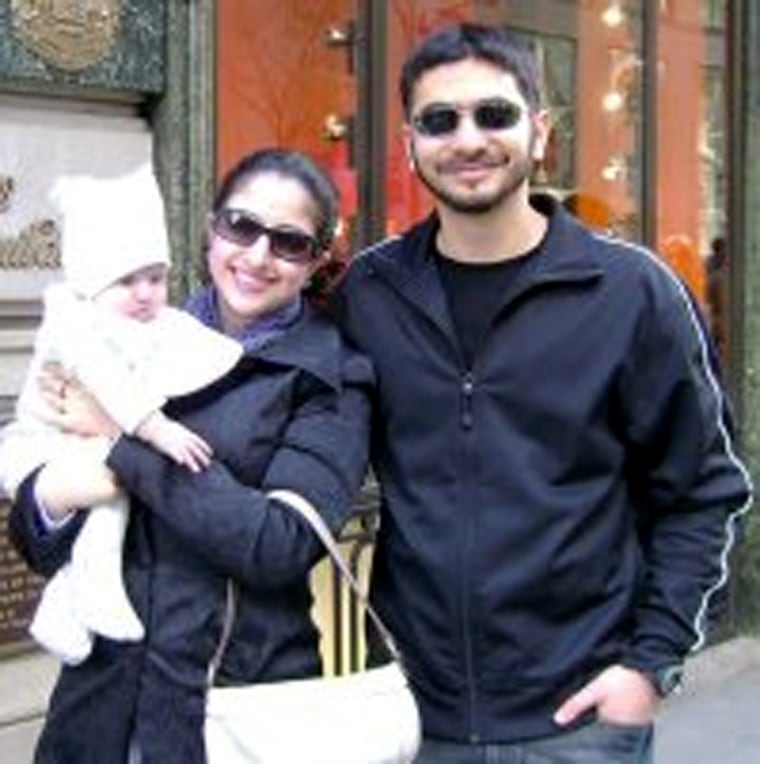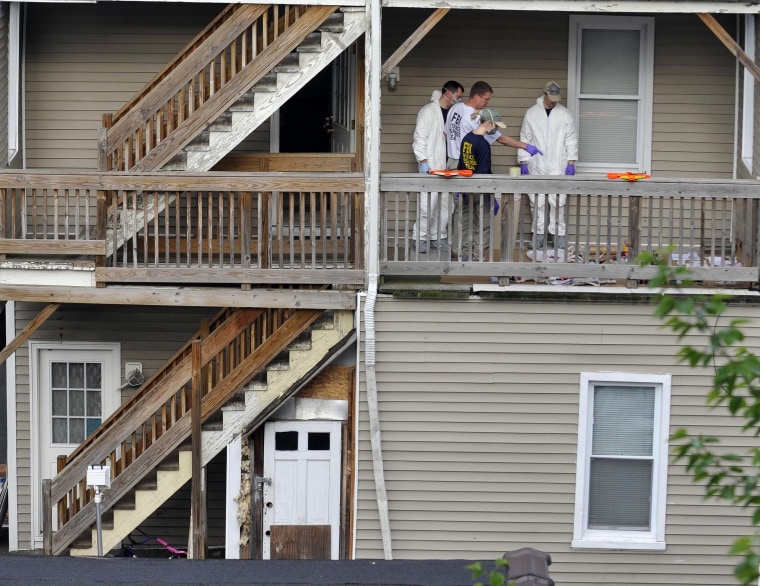The suspect in the Times Square bombing attempt had lived in the United State for most of the past 10 years and became an American citizen in Bridgeport, Conn. in April 2009, according to officials.
Pakistani-born Faisal Shahzad, 30, was charged Tuesday with trying to explode a weapon of mass destruction after Attorney General Eric Holdeer said he admitted trying to set off a car bomb in busy Times Square last weekend.
Documents reveal glimpses of Shahzad's time in the United States, including some recent difficulties.
At the time of his arrest, Shahzad and his wife, Huma Mian, were facing foreclosure on the compact home of gray vinyl shingles they owned on Long Hill Avenue near the center of Shelton, Conn., according to the Wall Street Journal.
Neighbors and brokers told the Journal that Shahzad and his wife had moved away and abandoned the house months ago. A lockbox with a key was on the front door, and the lawn was being mowed on behalf of the bank, J.P. Morgan Chase & Co., which issued the mortgage when the house was purchased in 2004, according to the Journal report.
Shahzad purchased his house in July, 2004 for $273,000, brokers said, with 20 percent down and an 80 percent mortgage with Chase, the Journal said.
Chase Home Finance filed a foreclosure action against the couple last September, and the court dockets indicate that neither Shahzad nor his wife showed up to defend themselves. They were listed as "non-appearing" parties. The most recent papers were filed in the case on April 23, according to the Journal.
After leaving the Shelton home, Shahzad moved to a home in Bridgeport, Conn., where FBI agents searched on Tuesday, removing filled plastic bags. A bomb squad came and went without entering as local police and FBI agents gathered in the cordoned-off street.
Kept to themselves
In Shelton, former neighbor Brenda Thurman told the New York Times that Shahzad and his wife spoke limited English and kept mostly to themselves. The couple had two young children, a girl and a boy, she said.
Thurman told the newspaper that the couple had lived at the house at 119 Long Hill Ave. for about three years before moving out last year. "He was a little bit strange," she told the Associated Press. "He didn't like to come out during the day."
She told the Wall Street Journal he liked to jog at night, wearing all black. He told her he didn't like the sunlight, she said.
At home, he sometimes wore ankle-length traditional Muslim garb, said Thurman, who lived next to Shahzad for more than three years, according to the Journal.
Thurman showed reporters a laptop computer showing a Facebook photo of her neighbor, the reported. The photo showed Shahzad with a woman and a child.

Another neighbor, Audrey Sokol, said she thought Shahzad worked in nearby Norwalk. Sokol, a teacher, said that he would wave and say hello and that he seemed normal to her.
The Shelton home is a two-story grayish-brown colonial with a sloping yard in a working-class neighborhood. On Tuesday morning, the home looked as if it had been unoccupied for a while.
Shahzad left around May 2009, Thurman said, and his wife followed about a month later.
Pakistani police told NBC News that Shahzad traveled from the United States to Karachi on July 3, 2009, returning to the United States on Aug. 8, 2009. During that time, he is believed to have traveled to Peshawar, a major city in the region bordering Afghanistan known as the Federally Administered Tribal Areas.
Recently returned from Pakistan Shahzad, who was born in Pakistan and became a U.S. citizen last year, had recently returned from another trip to Pakistan, this time for five months, according to law enforcement sources. They said his wife was in Pakistan. It is believed that Shahzad's Pakistani relatives reside in a middle-class neighborhood of Karachi called North Nazimabad, NBC said.
that Shahzad had ties to the United States dating back to at least December 1998, when he was granted an F-1 student visa. Immigration officials said then that there was “no derogatory information” on Shahzad in any database, a law enforcement official said in the Journal’s report.
Shahzad attended Southeastern University in Washington, D.C., then transferred in 2000 to the University of Bridgeport, Conn., where he received a B.A. in computer science and engineering, according to the Journal. He earned an MBA from there in 2005.
Ward Thrasher, assistant dean at the University of Bridgeport School of Business, recalled working with Shahzad in the spring of 2005 and described him as a "fairly unremarkable" student and individual.
He told NBC most of the faculty don't remember him at all, and although Shahzad earned his degree, he was "not a standout."
Thrasher said Shahzad was working full-time while earning his degree, and that "studying was not a priority for him."
For a while, according to the New York Times, Shahzad worked as an accountant for a firm that placed temporary employees. Among some discarded documents found outside his Shelton home, was a time card from Elizabeth Arden, the cosmetics maker, indicating that he had worked at its Stamford office in 2001. Officials at Elizabeth Arden refused to comment.
The documents, cited by the Times, also included a copy of what was apparently an old Pakistani passport — it expired in February 2000 and listed Shahzad’s occupation as “student” — and a United States student visa that expired at the end of 2002.
On university documents Shahzad appears to have filled out and signed, he lists his birthplace as Karachi, but a senior Pakistani official told the New York Times on Tuesday that he was born in Kashmir, a politically unstable area.
His path to citizenship began after he married his wife, a U.S. citizen and was granted a green card in January 2006, the New York Times reported.
